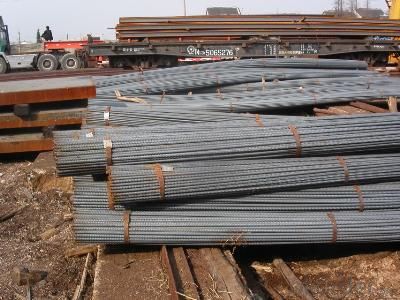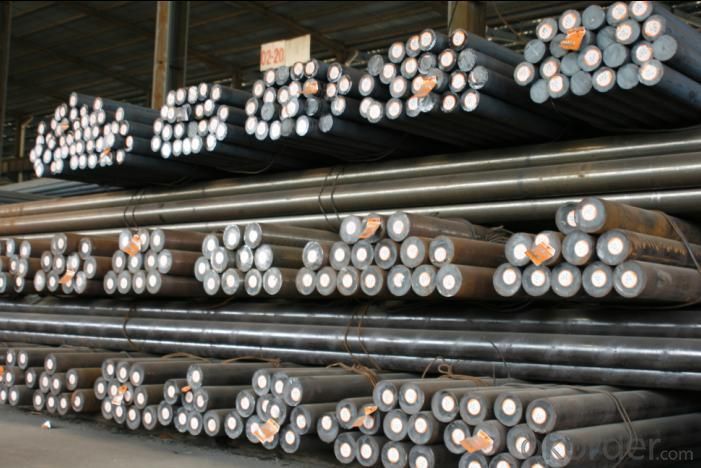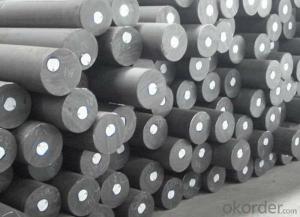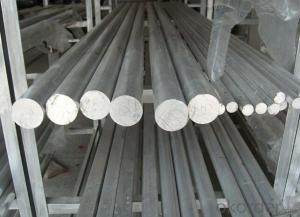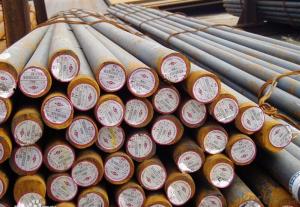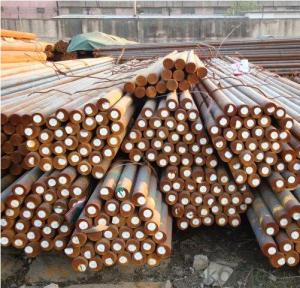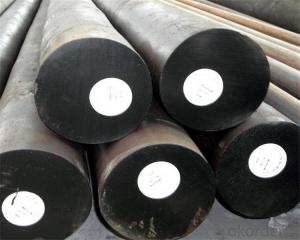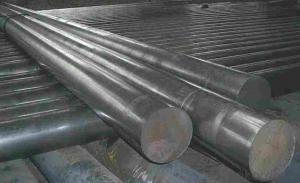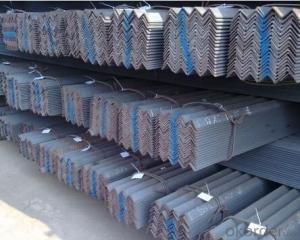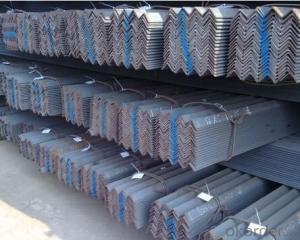Alloy Steel DIN 1.2379 with GB ASTM JIS
- Loading Port:
- China main port
- Payment Terms:
- TT OR LC
- Min Order Qty:
- 30 m.t.
- Supply Capability:
- 10000 m.t./month
OKorder Service Pledge
OKorder Financial Service
You Might Also Like
Specification
Alloy Steel DIN 1.2379 with GB ASTM JIS
Product Information:
1,Material: Forged Shaft
2, Good quality,competitive price
3,Diameter:100mm-1000mm
4, ISO9001 2000,BV,ABS
5,MOQ:30tons
Steel Grade:SAE 52100,Gcr15,SUJ2,4140,42CrMo4,4340,CK45,CK35,H13,D2,D3,1.2419,
9260,410,431,304,321,316,316L,1045,34CrNiMo6,100Cr6,A2,H21,SKD61,SKD11
5140,40Cr,5145,5130
Standards:ASTM,JIS,GB,EN(DIN,BS,NF) Or Per as clients’ requires.
1.Similar steel grade & equivalent steel materials:
| USA | Japanese | Gemany | British | France | International | Chinese |
| ASTM&AISI&SAE | JIS | EN DIN | EN BS | EN NF | ISO | GB |
| 52100 | SUj2 | 100Cr6 | 100Cr6 | 100Cr6 | ------ | GCr15 |
| 1.2067 | 1.2067 | 1.2067 |

Our Advantages:
· Industry experience over 20 years.
· Shipment of goods -More than 70 countries worldwide.
· The most convenient transport and prompt delivery.
· Competitive price with best service.
· High technical production line with top quality products.
· High reputation based on best quality products.
With our experienced, enthusiastic and dynamic staffs, we assure to bring you the products with best quality, reasonable prices and good after-sales services under the motto: Friends First, Business After.
Communication, Experience, Expertise and Best efforts are our Promises to you.
- Q: How does special steel contribute to reducing product costs while maintaining quality?
- Special steel contributes to reducing product costs while maintaining quality through several ways. Firstly, special steel possesses enhanced strength and durability, allowing manufacturers to produce products with thinner gauges or smaller dimensions, reducing material usage and overall costs. Additionally, its superior corrosion resistance and longevity ensure that the products have a longer lifespan, reducing the need for frequent replacements. Moreover, special steel's exceptional machinability enables efficient production processes, reducing labor costs and increasing productivity. Lastly, its high precision and consistency in manufacturing contribute to minimizing defects and waste, resulting in cost savings and improved product quality. Overall, special steel's unique properties and characteristics enable manufacturers to optimize production, thereby reducing costs without compromising on product quality.
- Q: What are the specific requirements for special steel used in the mining industry?
- Special steel used in the mining industry has specific requirements to ensure its durability, strength, and resistance to harsh conditions. Some of the key requirements for special steel used in the mining industry include: 1. High strength: Special steel used in the mining industry must have high tensile strength to withstand heavy loads and resist deformation under extreme conditions. This enables the steel to endure the pressure, impact, and stress that it may encounter during mining operations. 2. Wear resistance: Mining environments involve abrasive materials, such as rocks and ores, which can cause significant wear on equipment. Special steel used in the mining industry needs to have excellent wear resistance to prevent premature failure and increase the lifespan of mining equipment. 3. Corrosion resistance: Mining operations often take place in highly corrosive environments, such as underground mines or near water bodies. Special steel used in the mining industry should possess high corrosion resistance to withstand exposure to chemicals, moisture, and other corrosive agents. This helps prevent rusting, pitting, and other forms of corrosion that can weaken the steel. 4. Toughness: Mining equipment is subjected to heavy impacts and vibrations, which can lead to fractures if the steel is not tough enough. Special steel used in the mining industry should exhibit excellent toughness, allowing it to absorb energy from impacts and vibrations without fracturing. This ensures the safety and reliability of mining equipment. 5. Heat resistance: Mining operations involve high-temperature environments, such as smelting and refining processes. Special steel used in the mining industry must have good heat resistance to withstand the elevated temperatures without losing its strength or undergoing deformation. 6. Machinability: Special steel used in the mining industry should also have good machinability, allowing it to be easily formed into complex shapes or structures. This facilitates the manufacturing process of mining equipment and components. Overall, the specific requirements for special steel used in the mining industry revolve around strength, wear resistance, corrosion resistance, toughness, heat resistance, and machinability. Meeting these requirements is crucial for ensuring the reliability, durability, and safety of mining equipment in the demanding mining environments.
- Q: How is precipitation-hardening steel used in aerospace applications?
- Precipitation-hardening steel is widely used in aerospace applications due to its exceptional strength-to-weight ratio and resistance to corrosion. This type of steel is heat-treated to create a fine dispersion of precipitates, which significantly enhances its mechanical properties. In aerospace, it is commonly used for manufacturing critical components such as landing gear, structural frames, and engine parts. These materials provide the necessary strength and durability required to withstand the demanding conditions of flight while reducing weight to improve fuel efficiency and overall performance.
- Q: Can special steel be used in the glass manufacturing industry?
- Yes, special steel can be used in the glass manufacturing industry. Special steel is often used for making molds and tools required in the glass manufacturing process. It provides the necessary strength, durability, and heat resistance needed for handling and shaping molten glass. Additionally, certain types of special steel alloys are specifically designed to resist corrosion, making them suitable for use in the glass manufacturing industry where the presence of chemicals and high temperatures are common.
- Q: How is special steel used in the medical industry?
- Special steel is used in the medical industry for a variety of applications. It is commonly used in the production of surgical instruments, implants, and medical devices due to its exceptional strength, durability, and resistance to corrosion. Special steel ensures that these instruments and implants can withstand the harsh conditions of medical procedures and maintain their integrity over time, ensuring better patient outcomes.
- Q: How does special steel contribute to the renewable energy conversion efficiency?
- Special steel plays a crucial role in enhancing the renewable energy conversion efficiency by providing durability, strength, and resistance to extreme conditions. It is used in the construction of wind turbines, solar panels, and hydropower systems, ensuring their reliability and longevity. Moreover, special steel alloys facilitate the development of more efficient and lightweight components, reducing energy losses and optimizing the overall performance of renewable energy systems.
- Q: What are the advantages of using special steel?
- There are several advantages of using special steel. Firstly, it has superior strength and durability compared to regular steel, making it suitable for demanding applications and harsh environments. Special steel also offers excellent resistance to corrosion, heat, and wear, increasing its lifespan and reducing maintenance costs. Additionally, its unique properties enable manufacturers to create complex and intricate designs, resulting in more efficient and lightweight products. Overall, special steel provides enhanced performance, longevity, and versatility, making it a preferred choice in various industries.
- Q: Can special steel be used in construction?
- Yes, special steel can definitely be used in construction. Special steel refers to steel alloys that have been specifically designed and manufactured to possess certain properties and characteristics that make them suitable for various applications, including construction. One of the most common types of special steel used in construction is known as structural steel. This type of steel is specifically designed to have higher strength, durability, and flexibility compared to regular carbon steel. Structural steel is often used in the construction of buildings, bridges, and other infrastructure projects due to its ability to withstand heavy loads and resist external forces such as wind, earthquakes, and impact. Special steel also offers other advantages in construction. For example, stainless steel is commonly used in the construction of architectural features and building facades due to its corrosion resistance and aesthetic appeal. Additionally, weathering steel, which forms a protective rust-like coating when exposed to the elements, is often used in outdoor structures and bridges to eliminate the need for regular painting and maintenance. Furthermore, special steel can be tailored to meet specific requirements in construction projects. For instance, high-strength low-alloy (HSLA) steel is used in the construction of tall buildings and structures to reduce weight while maintaining structural integrity. This allows for more efficient use of materials and cost savings. In summary, special steel is widely used in construction due to its superior strength, durability, corrosion resistance, and other desirable properties. Its versatility allows for the optimization of construction projects, ensuring safety, longevity, and cost-effectiveness.
- Q: How does special steel contribute to the strength of structures?
- Special steel contributes to the strength of structures by providing enhanced properties such as high tensile strength, durability, and resistance to corrosion. This type of steel is specifically engineered to withstand heavy loads, extreme conditions, and harsh environments. Its superior strength allows for the construction of structures that can support more weight, withstand greater pressures, and resist deformation. Whether used in buildings, bridges, or machinery, special steel plays a vital role in ensuring the structural integrity and longevity of various constructions.
- Q: What are the safety considerations when working with special steel?
- When working with special steel, there are several safety considerations that need to be taken into account. Firstly, special steel can have high heat resistance, so it is important to use appropriate personal protective equipment (PPE) such as heat-resistant gloves, face shields, and fire-resistant clothing to prevent burns or other heat-related injuries. Secondly, special steel can be heavy and may require the use of lifting equipment or proper lifting techniques to prevent strains or muscle injuries. Additionally, special steel may contain elements or chemicals that could be hazardous if inhaled or ingested, so proper ventilation and respiratory protection should be used. Lastly, the use of sharp tools or equipment is often necessary when working with special steel, so it is crucial to follow safe handling practices and use proper tool guards to prevent cuts or punctures. Overall, awareness of these safety considerations and adherence to safety protocols is essential to ensure a safe working environment when dealing with special steel.
Send your message to us
Alloy Steel DIN 1.2379 with GB ASTM JIS
- Loading Port:
- China main port
- Payment Terms:
- TT OR LC
- Min Order Qty:
- 30 m.t.
- Supply Capability:
- 10000 m.t./month
OKorder Service Pledge
OKorder Financial Service
Similar products
Hot products
Hot Searches
Related keywords




